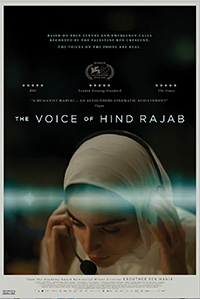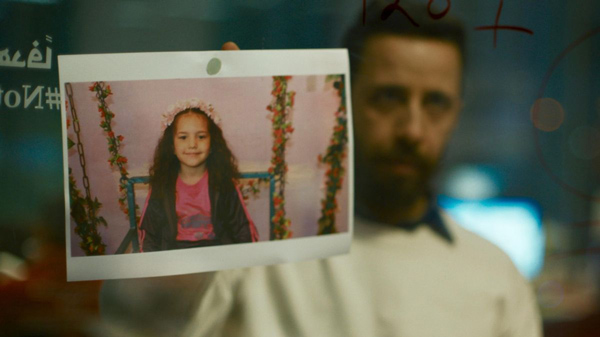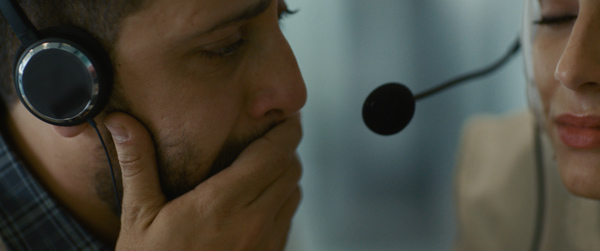In a Child’s Name: Ben Hania’s Grueling Portrait of Genocide
 It’s the responsibility of artists to use their platforms as a mechanism to speak truth to power. When it comes to cinema, an art form whose blows are sometimes lessened by a process which always situates the past tense, there’s a comforting detachment in reflecting on trauma or despair from the safety of the present. But in the case of The Voice of Hind Rajab, the seventh feature from Tunisian director Kaouther Ben Hania, she’s conjuring events from seventeen months prior in the ongoing Gaza War, a genocidal event that’s only worsened since. The immediacy of the title’s importance is speaking directly to the present, utilizing cinema as the tool to break through the apathy of the news cycle and the cynical desensitization by those privileged enough to turn a blind eye to the conflict of foreign lands, where death tolls are merely daily headlines scrolled past, forgotten. Much like Ben Hania’s previous feature Four Daughters (2023), this is cinema of recuperation, but it’s in striking distance of today.
It’s the responsibility of artists to use their platforms as a mechanism to speak truth to power. When it comes to cinema, an art form whose blows are sometimes lessened by a process which always situates the past tense, there’s a comforting detachment in reflecting on trauma or despair from the safety of the present. But in the case of The Voice of Hind Rajab, the seventh feature from Tunisian director Kaouther Ben Hania, she’s conjuring events from seventeen months prior in the ongoing Gaza War, a genocidal event that’s only worsened since. The immediacy of the title’s importance is speaking directly to the present, utilizing cinema as the tool to break through the apathy of the news cycle and the cynical desensitization by those privileged enough to turn a blind eye to the conflict of foreign lands, where death tolls are merely daily headlines scrolled past, forgotten. Much like Ben Hania’s previous feature Four Daughters (2023), this is cinema of recuperation, but it’s in striking distance of today.
In January of 2024, the Israeli government ordered the evacuation of the Tel al-Hawa neighborhood in southern Gaza. Fifty-two miles away in Ramallah, emergency responders at Palestine’s Red Crescent society have been overwhelmed with coordinating assistance to the wounded as they must utilize either the Red Cross or the Ministry of Health to secure safe passage for ambulances through COGAT, the Israeli military’s branch dedicated to coordinating civilian services. Omar (Motaz Malhees) receives a call from a man in Germany who claims his relatives are trapped outside of a gas station in Tel al-Hawa. Omar calls the number only to hear a woman be shot and killed on the line. As Nisreen (Clara Khoury) coaches Omar through their process of dealing with this experience, they learn a six-year-old girl named Hind Rajab is still alive in the car. Omar, who is becoming increasingly emotionally erratic, is assisted with speaking to the little girl with his supervisor Rana (Saja Kilani). But minutes turn to hours and Omar begins to lash out at their colleague Mahdi (Amer Hlehel) who is responsible for initiating the coordination rippling through layers of intermediaries.

To be critical of a film like The Voice of Hind Rajab often defeats its purpose. The merits of its intentions rise beyond its faults in addressing the present while also existing as an eternal time capsule documenting an ongoing war with no end in sight. But it is certainly not filmmaking without faults, though the swiftness with which it was made on a presumably tight budget is commendable. Purportedly, cast members workshopped their roles with assistance from their real-life counterparts, and were not confronted with the voice recordings of Hind Rajab until they were in front of a camera. This clearly keeps visceral reactions intact, and yet, it also is what allows all of the footage not directly engaged with the actual audio recordings a quality akin to an agitprop stage play. The anguish takes on a performative essence, with hand wringing masquerading as heroics, particularly with Omar and Rana, who increasingly behave in ways which question how much training they’ve received.

Of course, training scenarios are never quite like experiencing a real-life event, and one never knows how they’re going to react in actuality, prepared or not. But the point is, the actors may have also been trained in their capacity of research and workshopping, but their reactions feel as if they’re conduits for the benefit of ignorant audience members. On paper it’s Kafkaesque level bureaucratic red tape, as it seems unbelievable a child (who can already articulate an understanding of blood, gunfire, death) hiding amongst the cooling corpses of her family in the confines of a car cannot be rescued by an ambulance stationed only eight minutes away.
The Voice of Hind Rajib is also a portrait of the toxic ripple effects of war for those safely outside its vicinity. Even the most highly trained responders can be worn down dramatically after an emotionally intense situation stretching on endlessly for hours. It’s the women who, as time ticks on, are forced to remain on the line as long as possible with the child, the emotional outbursts almost exclusively instigated by Omar, whose interference is only helpful for his own catharsis (and, if there’s truth to this person’s behavior, it suggests he’s not rightly equipped to remain working as an emergency responder). But despite these squabbles, it’s distressing to watch this extreme duress, for their helplessness is also a reflection of the audience’s. There’s little time for levity, though the innocence of the child, who asks Rana to call her husband so they can come pick her up themselves, is reflected in her understanding of the way she’s the world. Ironically, she goes to pre-school at an establishment called “A Happy Childhood.” If these conversations were fictional, they’d seem contrived, but this is the reality we’re living in.
The intensity of the situation leads to vicious finger pointing on Omar’s part, who doesn’t believe Mehdi is doing enough to coordinate the necessary intermediaries. “It’s because of people like you we’re occupied,” he screams. Moments later, both men placate each other by playing video games on their phones as they endlessly wait for the green light to send the ambulance to Hind Rajab. It’s ludicrous but authentic as a desperate means of escape. The film’s final moments include footage of the car which held Hind Rajab, her mother standing outside its remains. It’s audio and visual imagery impossible not to feel moved by. And it’s a testament reaching beyond the shelf-life of the news cycle documenting the genocide of the Palestinians, the world watching its progress in real time.
Reviewed on September 3rd at the 2025 Venice Film Festival (82nd edition) – In Competition. 89 Mins.
★★★½/☆☆☆☆☆


